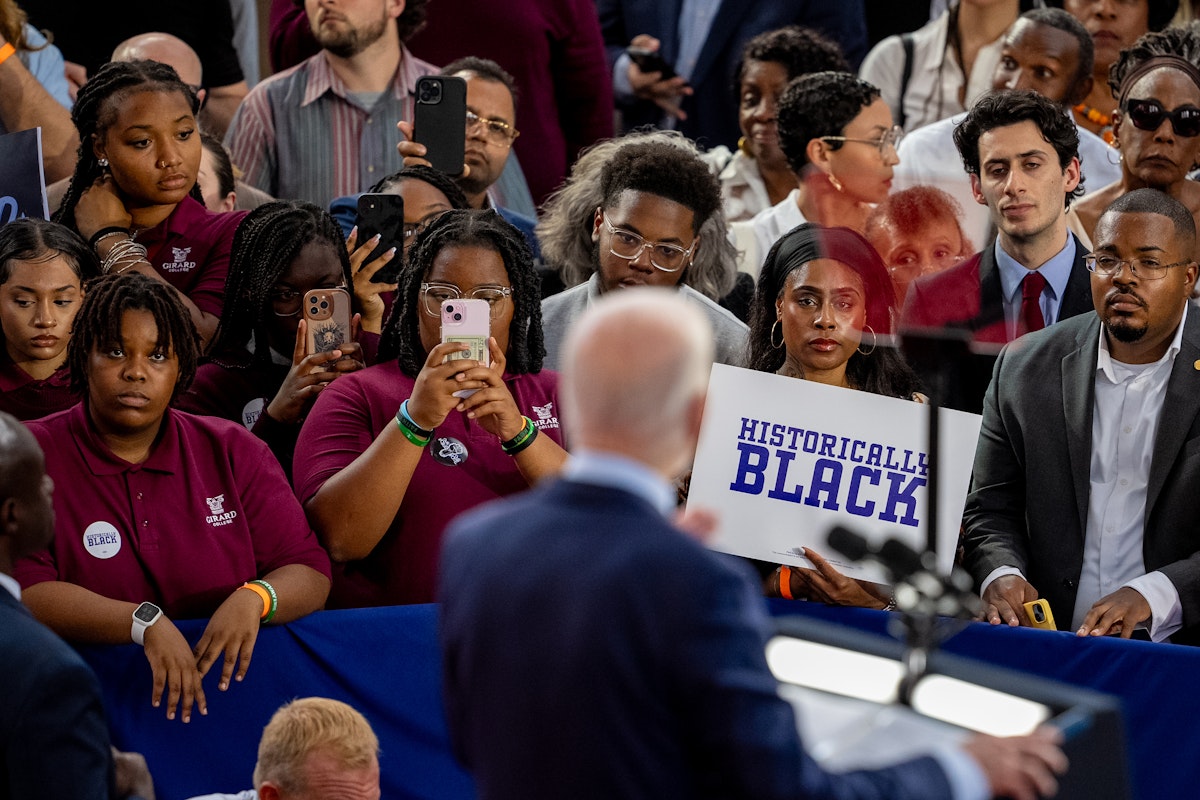The polling was jarring, and the political narrative too juicy to resist. Stoked by surveys showing him getting as much as 23 percent of the Black vote, Donald Trump, with characteristic hubris, claimed he was capturing the Democrats’ most reliable base voters, trotting out supporters in “Blacks for Trump” T-shirts and holding what is typically an exclusively Democratic event—a rally in a Black Detroit church. The headline of one Wall Street Journal column gleefully touted it as “Biden’s Worst Nightmare.” A gobsmacked CNN political data reporter concluded that Black voters were leaving the Democratic Party “in droves,” with the country headed toward a “historic” political shift. Other polling showed a dramatic shift among Hispanic voters from Biden to Trump, with the sitting president losing ground among—or outright losing—Latinos to the man who separated immigrant families at the border, called Mexicans rapists, and promises mass deportations.
The polling bomb set off a moral panic on the left that lingers, fueling fears that shifting minority votes could send back to the White House the man who called for the death penalty for the later-exonerated Central Park Five—and never apologized for it—who demonizes cities run by Black leaders, who cozies up to white supremacists, and has castigated immigrants as “bad hombres” who are “poisoning the blood” of American lineage.
A closer examination of the polling indicates Biden is not in as much trouble with minority voters as the Trump campaign believes (or at least would have the public believe). The president indeed suffers from a dearth of enthusiasm from a cranky electorate, but that’s an across-the-board problem. It’s not particular to Black and Hispanic voters. And if historical trends hold, Biden has a solid chance of bringing those traditional Democratic voters back home come November.
First, it’s fair to question whether the polling itself—while useful—is dispositive. Democrats have weathered similar scares in recent cycles. In 2022, a preelection poll by the nonpartisan National Association of Latino Elected Officials found that 57 percent of Latinos favored Democratic candidates for Congress. Exit polls determined that 64 percent voted for a Democratic House candidate. A projected drop in female Hispanic support never materialized: While 56 percent said before the election they’d vote for the Democrat in the midterms, 68 percent actually did so. That’s largely because the “undecideds” in that poll went for the Democrats, coming home in November as the party counted on them doing. And it’s in tune with elections from 2022 on, where Democrats have consistently overperformed in contests ranging from mayor to congressman.
Surveys of Black voters too seem inconsistent with the sky-is-falling reporting from the horse-race polling data. A Pew Research poll of Black voters in May found them consistently identifying with the Democratic Party in high numbers (83 percent to 88 percent since 1994). There’s very little party crossover in presidential races, making it unlikely that Trump picks up a significant part of that vote.
And as with Latinos in the midterms, there is historical evidence that disaffected Democratic base voters may withhold support for the party in interviews with pollsters but pull the Democratic lever in November. Fox News, reporting this week that Biden is ahead of Trump for the first time since October 2023, noted that the Democrat had 79 percent Black support in one of its 2020 surveys—but then went on to win 91 percent of the Black vote in Fox’s own exit poll that year.
This isn’t to suggest that Biden hasn’t lost some ground among these voters. A recent Suffolk University poll of Black voters in Michigan and Pennsylvania—more credible than broader surveys because the sample was limited to African Americans—showe
